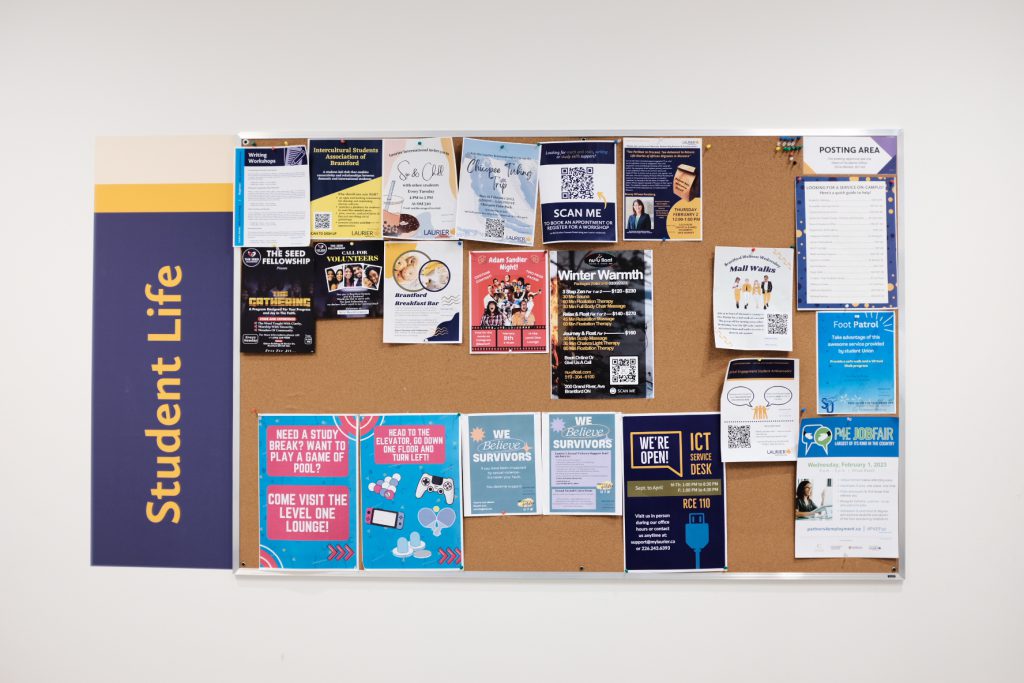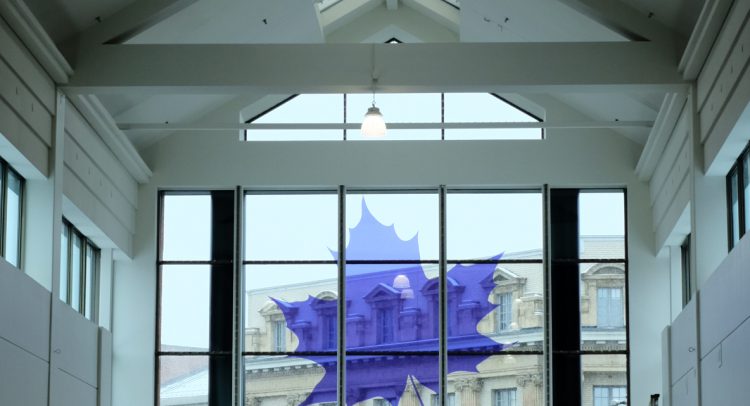LAURIER LAUNCHED THRIVE WEEK IN 2017 TO SUPPORT STUDENT MENTAL HEALTH
By Siqing Xiong
Unlike most international students, Weenie Zhao didn’t study at an international school so she wasn’t exposed to foreign education in high school or earlier. Instead, Zhao, who is now a second-year business technology management student at Wilfrid Laurier University, attended a Chinese traditional high school and temporarily decided to study abroad.
When she came to Canada, she had to make a big transition with the language. But it was also her first time leaving her family, and the pressure from studying and being alone sometimes made her feel stressed and began affecting her mental health.
Zhao always closed herself in her room. “Sometimes I can hear she was crying at night because the room was not soundproof,” said Zhao’s roommate Yolly Chen, a CIBC intern who works from home.
For Zhao, who struggles with anxiety disorder, Laurier’s Thrive Week events helped reduce her symptoms by getting her out of her room.
In March 2022, Zhao joined a fitness class, hosted by Athletics and Recreation — one of the Thrive Week campus partners. “This activity was about introducing leg exercise in fitness, it distracts me from stress a lot,” said Zhao. “I just know the gym is free to enter with our student card, after that I started doing exercises three times a week.”
Thrive Week provides students with different mental health resources and supports, in a week-long series of free events that are open to all Laurier students. Some of the events include exercise classes, workshops, social activities — all aimed at supporting student mental health.
“Mental health is connected to so many different areas of wellbeing and wellness, so have a week with such a variety of events emphasizes how these different areas work together to boost mental health,” said Claire Howarth, the wellness education coordinator at Laurier Brantford.
Laurier students have increasing mental health needs
The university has been pushing to improve student mental health. The number of Laurier students struggling with feeling overwhelmed, depressed and anxious about living up to academic demands are on the rise. According to the 2019 National College Health Assessment survey, the top three health factors that Laurier students reported as having an affect on their learning experience were all mental-health related — 46.6 per cent reported feeling stressed, 41.6 per cent reported suffering from anxiety, and 28.5 per cent were depressed.
The demand for students seeking help has increased and Laurier is struggling to keep up.
“The school is experiencing higher than normal volumes with respect to emails and telephone calls which has impacted our response times,” said Karen Axford, a service Laurier advisor.
Xuan Zhang, a third-year business technology management student, said the university took more than a week to respond to an email asking for help. But that wasn’t always the case. “I looked through the school email three years ago and I usually got a reply within two days.”
A new approach to student mental health
In 2017, Laurier’s Wellness Education Centre launched Thrive Week on the Waterloo and Brantford campus to support students and raise awareness about available mental health supports. Along with exercise classes, workshops and social events, the week also includes yoga classes, mindfulness classes, suicide intervention workshops and a breakfast bar.
Workshops focus on resilience, regulating emotions around anxiety and depression, self-care, suicide intervention and growing students’ strengths.
At 9:30 a.m. on a Monday in October, the Wellness Education Centre is holding a breakfast bar event to kick off the fall term Thrive Week in One Market building on the Brantford Campus. Pulling open the lobby door, the sound of faint talking becomes louder and louder. Near the atrium, where more than 30 people gather, a table is filled with bagels, breads, and yogurts. In the left corner of the atrium, a tall, short-haired girl wearing a white sweater and black leggings, smiles and talks to another person wearing a long black dress and a headscarf.
“This is my second time joining Thrive Week,” said Zhao, holding a piece of bread in her hand.
Zhao said she didn’t adjust well to switching from the Chinese classroom mode to the foreign mode during her first year of university. In China, schools use strict teaching methods before students enter university. Teachers come to the classroom every day and push students to finish their assignments and students’ learning outcomes are only focused on grades.
“I’m much better now, I just realized that I was putting too much pressure before and shouldn’t only focus on studying,” said Zhao. “I have made many new friends and we often study and play together after class. The person who came with me is a friend I met at last year’s event.”
Peiyi Zhou, a third-year student in mathematics at Shanghai Jiao Tong University, said she’s surprised Canadian universities would spend a week helping students build positive mental health.
“I’ve never heard about a similar initiative to help student mental health like Thrive Week,” she said. “It sounds fun. I want to participate, it feels more like an interactive way to learning about mental health, not just a one-way teaching approach.”
Zhou said her university in China brings in a keynote speaker to talk about mental health. About 100 students from different faculties sit in an auditorium and listen to the presentation.
“This is a mandatory event which counts towards credits. If you don’t attend, credits will be deducted,” Zhou said. “Actually, I don’t think it’s useful. Many students are playing with their phones, chatting or sleeping during the keynote speech.”
Chinese universities offer psychological counselling, mental health lectures and mental health hotline services in response to students’ mental health issues but nothing like Thrive Week.
“Thrive Week is a great week of events to support student mental health,” said Howarth. “There are such a variety of events from so many campus partners that it provides ways for students with many varying interests to get involved and boost their mental health, especially at what can be a stressful time of the academic year.”
One popular event at Laurier’s Waterloo campus is “paint, plant and peers,” which helps students relax by painting a clay pot while getting to know their peers.
“We are really enjoying this creative process, all of us just having a good time,” said Luisa Huang, a third-year business administration student.
Huang said focusing on painting makes her slow down and really relieves stress. It gives her a feeling of immersion in her own world.
“Honestly, I don’t pay much attention to any activities at school because the busy study schedule makes me stressed,” said Huang. “Last year, my friend invited me to a yoga class held during Thrive Week. It has really put me at ease and empowered me a lot.”
Huang said she feels like the university really cares about students, which makes her feel a sense of belonging.
The number of students who join Thrive Week has been growing since 2017, said Sarina Wheeler, Laurier’s wellness education coordinator.
In October 2022, about half of Laurier students across the Waterloo and Brantford campuses joined in the Thrive Week kick-off event — a pancake breakfast on the Waterloo campus and a breakfast bar on the Brantford campus.
Thrive Week first began in 2009 as an idea between two colleagues at the University of British Columbia. Many universities and colleges across Canada have started their own Thrive Week events since then, such as Queen’s University in Kingston, McMaster University in Hamilton, and the University of Waterloo. At Laurier, Thrive Week runs twice a year, in October and March.
The wellness education team generally starts planning for the week at the beginning of each term, but think about ideas for Thrive Week all year long, said Howarth. “Since we work with campus partners, like the athletic and recreation team, they schedule the events, they choose the type of event and when they are available to run the event during Thrive Week.”

In October 2022, Laurier held 47 Thrive Week events across the Waterloo and Brantford campuses.
“We are happy that more students are participating in Thrive Week, this is a positive sign that shows students are willing to take time focusing on their mental health,” said Wheeler. “I think Laurier is a place where students are cared for and hopefully students feel that care.”
According to Macleans magazine’s Rankings for Canadian Universities, Laurier ranked first nationally in “satisfaction with decision to attend Laurier”, “student life staff,” and “extracurricular activities” from 2017 to 2020.
From 2017 to 2020, the university’s ranking for mental health services improved significantly from 14th to fourth. Laurier also ranked third in “student service” among 15 Canadian comprehensive universities in 2022.
Motivation is still a factor
But despite its commitment to Thrive Week, the university never pushes the events onto students. “Motivation is a big thing. Students don’t have to attend Thrive Week if they don’t want to,” said Wheeler.
In October 2022, Zhao attended an online workshop called “mental toughness and stress management” via Zoom, which provided students with tools and strategies to help them deal with unneeded and uncontrollable stress.
The number of people attending the meeting was less than she thought because there were many people at the opening breakfast bar event, Zhao said.
“Quite a few people left during the workshop,” said Zhao. “I don’t think virtual activities work for everyone.”
According to Academic Motivation: Concepts, Strategies and Counseling Approaches, motivation is essential for students’ learning development.
Laurier has tried to encourage students to join in Thrive Week through prizes, such as a chance to win a $150 gift card.
According to the Centre on Education Policy, a national group for public education and for better public schools, rewards can have positive effects if they are used thoughtfully and within a set of guidelines. But poorly designed rewards can decrease motivation if they are targeted at the wrong students or are used ineffectively. For example, more students may join activities because of prizes, but they’ll also lose interest when prizes are removed.
“Our goal for Thrive Week is to raise awareness of and support for student mental health, as well as to educate students about the resources available on campus,” said Wheeler. “Using prizes to attract students to participate in Thrive Week has somewhat defeated our original purpose.”
Howarth said the wellness education team at Laurier also encourages students to attend Thrive Week through promoting the events on social media and through word-of-mouth. Wellness Education also works with campus partners to promote Thrive Week.
But even with all the best efforts, there are still some students with overwhelming anxiety that universities can’t reach through events like Thrive Week, said Sarah Chen, a psychologist at Inner Balance Counseling Services in Waterloo.
“They avoid on-campus mental health service because they don’t feel they have poor mental health, or they want to avoid stigmatization,” said Chen.
The Centre of Addiction and Mental Health reported stigma prevents 40 per cent of people with anxiety or depression from seeking medical help.
Laurier continues to support and make student mental health a top priority. Helping students maintain their mental health is critical to supporting student resilience and success. Students are an important part of forming a large and diverse Laurier community, said Howarth.
Each Thrive Week, students who participate in events are encouraged to fill out a mental health feedback form to share their feedback and ideas for Thrive Week.
“We use that information to continue improving Thrive Week each time we run it,” Howarth said.
Other universities in Ontario also introduced similar initiatives to help build good mental health skills. For its part, the University of Toronto offers a meditation class for students during the final exam period.

